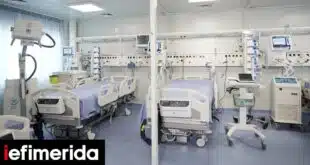Η έγκαιρη διάγνωση του καρκίνου του εντέρου μπορεί να αυξήσει τις πιθανότητες θεραπείας, τα προειδοποιητικά σημάδια όμως εμφανίζονται συνήθως όταν η ασθένεια έχει φτάσει σε προχωρημένο στάδιο.
Around 16,800 Brits die from bowel cancer every year, making it the second biggest cancer killer in the UK – meaning symptom awareness is front and centre. The doctor said: “Bowel cancer is thought to have a long premalignant phase. It may take 10 years for bowel cancer to grow from a small bowel polyp.”
In stage two of bowel cancer, the tumour has grown through the bowel wall and may have spread to nearby tissue. It has not spread to lymph nodes or distant parts of the body, and some people may not have symptoms at this point. Symptoms usually strike during stage three and four, including blood in the poo and lower abdominal pain.
Σχεδόν όλοι οι πάσχοντες επιβιώνουν από τη νόσο εάν διαγνωστούν στο αρχικό στάδιο. Καθώς προχωρά η πάθηση ωστόσο, οι πιθανότητες ίασης μειώνονται σημαντικά.
Κατά τη διάρκεια του πρώτου σταδίου ο καρκίνος έχει αναπτυχθεί μέσω των κυττάρων που καλύπτουν το τοίχωμα του εντέρου και στο μυϊκό τοίχωμα των εντέρων, αλλά δεν έχει εξαπλωθεί περαιτέρω. Στο στάδιο 1 ο καρκίνος του εντέρου συνήθως δεν έχει συμπτώματα.
Περίπου 16.800 Βρετανοί πεθαίνουν από καρκίνο του εντέρου κάθε χρόνο, καθιστώντας τον την δεύτερη αιτία θανάτου από καρκίνο.
Οι ειδικοί πιστεύουν ότι ο καρκίνος του εντέρου έχει μια μακρά προκακοήθη φάση. Μπορεί να χρειαστούν 10 χρόνια για να εξελιχθεί ένας πολύποδας σε καρκίνο του εντέρου.
Στο δεύτερο στάδιο του καρκίνου του εντέρου, ο όγκος έχει αναπτυχθεί μέσω του τοιχώματος του εντέρου και μπορεί να έχει εξαπλωθεί σε κοντινό ιστό. Δεν έχει εξαπλωθεί σε λεμφαδένες ή μακρινά μέρη του σώματος και μερικοί άνθρωποι μπορεί να μην έχουν συμπτώματα σε αυτό το σημείο. Τα συμπτώματα εμφανίζονται συνήθως κατά τη διάρκεια του σταδίου τρία και τέσσερα, συμπεριλαμβανομένου του αίματος στην πτώχευση και του πόνου στην κάτω κοιλιακή χώρα.
According to Dr Lee, symptoms of bowel cancer that often crop up during these stages include:
Blood in the stools
Bleeding from the rectum
A change in bowel habits with diarrhoea or constipation
Lower abdominal pain
A change in the shape of the stool – such as long narrow stools
Excessive gas from the back passage.
The NHS adds that losing weight without trying, feeling very tired for no reason, bloating, and often feeling like you need to poo – even if you have just been – are also red flags to watch out for. The health body advises anyone who has symptoms of bowel cancer for three weeks or more to contact their GP immediately.
“In stage three bowel cancer, the cancer has spread to the lymph nodes but not elsewhere in the body,” Dr Lee explained. “In stage four, it has spread for example to the lungs or the liver.” Dr Lee added: “In stage three or four bowel cancer, patients often have symptoms such as fatigue, weakness, abdominal pain, weight loss and vomiting.
“It can also cause jaundice (yellowing of the skin) and shortness of breath.” Dr Lee urged: “If you have any worries, see your GP. Don’t be embarrassed. Even your GP sits on the toilet! They will be pleased you have come to see them and be more than happy to do all they can to help you. Don’t leave it to chance.”
Ways to reduce risk of bowel cancer
The Office for Health Improvement and Disparities suggests that half of all bowel cancers could be prevented by lifestyle changes. Reducing the intake of processed and red meat and increasing your consumption of fibre are important dietary interventions.
138437485146
Other risk factors include:
Being over the age of 50
Drinking alcohol
Smoking
Obesity
A family history of bowel cancer
Inflammatory bowel disease
Polyps in the bowel
Lynch syndrome
Familial adenomatous polyposis.
Keeping active and maintaining a healthy weight could also help prevent the development of cancer. Dr Lee stated: “Interestingly, dogs can smell bowel cancer. In one study, dogs were as successful as colonoscopy (telescope in the bowel) at detecting bowel cancer.
“Dogs are very sensitive at detecting chemicals produced by the tumour, in the exhaled breath and the poo.” If you have any concerns, it is advised that you speak to your doctor. The sooner a tumour is diagnosed and treated, the better the outlook is likely to be.
Πηγή
 Daily-News.GR Η Καθημερινή σας ενημέρωση – dailynews.gr
Daily-News.GR Η Καθημερινή σας ενημέρωση – dailynews.gr








